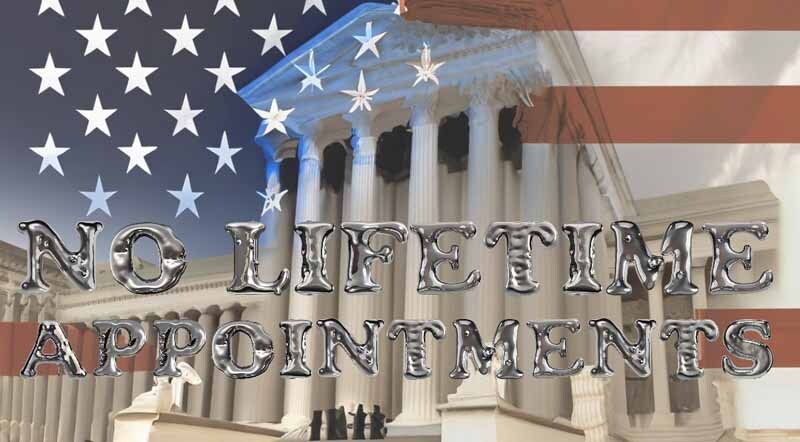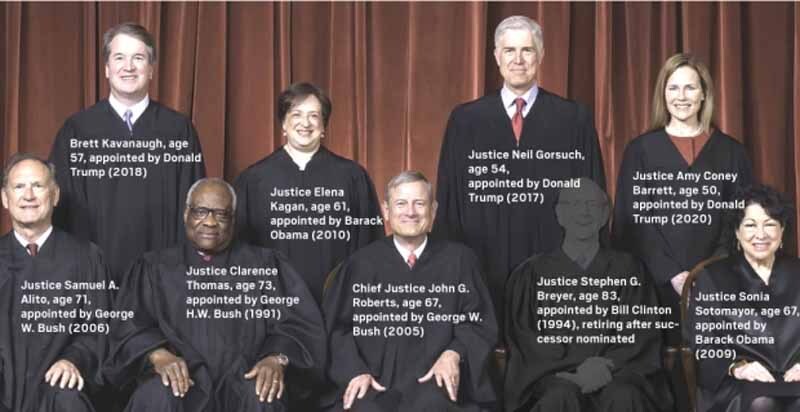Notifications
 admin -
June 10, 2023 -
Arts & Culture -
Supreme Court
lifetime appointments
-
46.6K views -
0 Comments -
0 Likes -
0 Reviews
admin -
June 10, 2023 -
Arts & Culture -
Supreme Court
lifetime appointments
-
46.6K views -
0 Comments -
0 Likes -
0 Reviews

DLNews Politics:
The Supreme Court comprises nine justices appointed by the president and confirmed by the Senate for life. The justices interpret the Constitution and decide cases that raise constitutional questions.
Lifetime appointments mean the justices are susceptible to undue influence. And that’s happening a lot.

The Janus Decision
In the last decade, an energized campaign against workers' rights has been waged at all levels of government. But state and local government employees have been the target of fierce attacks, including repeated legal challenges to their unions' ability to represent them.
In one of the most closely watched cases of this term, the Supreme Court ruled 5-4 in Janus v. AFSCME that public employees who decline to join a union may not be forced to pay a fee to cover the costs of the union's representation, known as agency fees. The decision overturned decades of established law and precedent, costing unions millions of dollars in lost revenue.
Justice Alito wrote the majority opinion in Janus, joined by John Roberts, Clarence Thomas, and Neil Gorsuch. The dissent, authored by Justice Kagan, was joined by Justices Ginsburg and Breyer. The Foundation is currently litigating dozens of follow-up cases nationwide seeking to reverse the decision.
The Reproductive Rights Case
When Politico revealed a leaked draft of a majority Supreme Court opinion that would overturn Roe v. Wade and Casey, it sent shockwaves through organized labor. In a response that reflects changing sentiments, many unions have made general statements of support for reproductive rights. A few, such as AFSCME and NewsGuild-CWA, have pledged more concrete action to fight against state anti-abortion laws.
Reproductive freedom is a fundamental human right and part of people's rights to equality and privacy. We must protect this right, not just women's health but also the economic security and well-being of families everywhere.
The Justices Alito, Gorsuch, and Kavanaugh sided with the Mississippi law, while Stephen Breyer, Sonia Sotomayor, and Elena Kagan filed a joint dissent. In her dissent, Justice Sotomayor, about other cases such as Griswold, Lawrence, and Obergefell, pointed out that if the Constitution does not explicitly mention these rights, the court has recognized them as "substantive" rights protected by the due process clause.
The Environmental Case
This year, the Supreme Court will take on a case that could reshape how federal agencies interpret and apply old laws. The case, Sackett v. EPA, revolves around a metric the Obama administration used to justify its climate rules. The “social cost of carbon” metric considers the damages caused by greenhouse gases from all sources, including electricity, transportation, and agriculture.
Several states still need to block the metric in lower courts and ask the Supreme Court to step in. Environmental lawyers worry that a decision favoring the conservative justices would handcuff future regulatory efforts and could affect other areas of the law, including workplace safety, health care, and telecommunications.
But legal observers say it’s hard to predict how the justices will rule in the case. The judges have clarified that they are wary of relying on legal precedent. And they are already chipping away at environmental protections. That’s why it’s so important for activists to keep their arguments grounded in statutory text.
The Voting Rights Case
In a time when the Supreme Court has lurched so far to the right, ignoring the Constitution and the public, term limits for justices may seem like a no-brainer. By setting a mandated retirement age, it would disincentivize the current practice of judges gaming their departure dates by waiting until a president they tend to agree with is in the White House; it would make it easier for the public to hold them accountable for their decisions; and it would reduce the risk that the Court becomes so partisan it can no longer function effectively.
But a constitutional amendment to set age and term limits for the Supreme Court also risks politicizing the nomination process. Instead of finding the best candidate to fill a seat, parties could spend their time searching for candidates who can say the right things in confirmation hearings to ensure they get their way in years to come.

At Desert Local News, connections are everything. We're not just another social networking platform—we're a lively hub where people from all walks of life come together to share stories, spark ideas, and grow together. Here, creativity flourishes, communities grow stronger, and conversations spark global awareness.